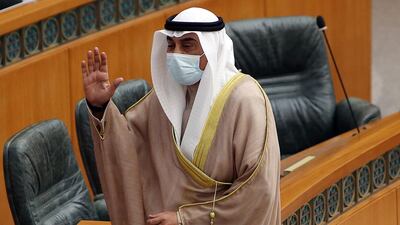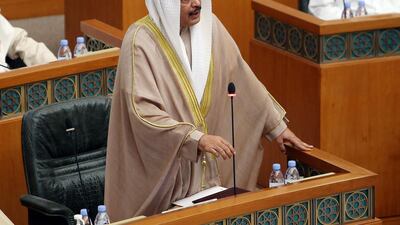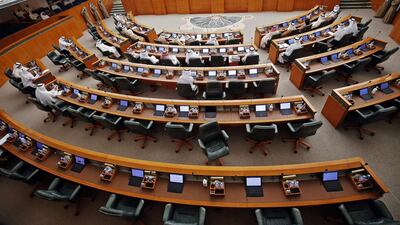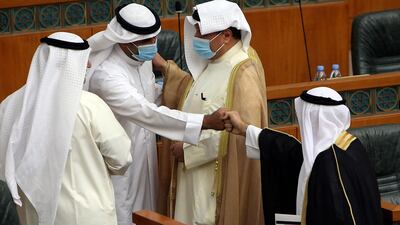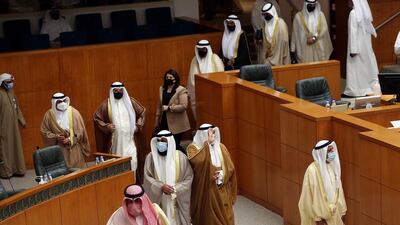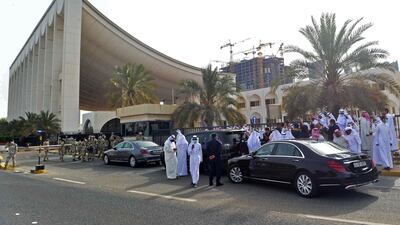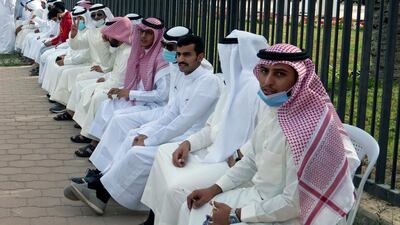Kuwait’s Cabinet on Tuesday agreed to a $2bn bonus for frontline staff battling against Covid-19 in recognition of their “efforts and sacrifices”.
The bill will now go to the parliament before final ratification by Sheikh Nawaf Al Ahmed, the emir of Kuwait.
Kuwait has conducted 600,000 vaccine injections so far but cases have continued to rise since December, now standing at 228,299 infections and 1,298 deaths.
The cabinet also approved Health Minister Sheikh Basel Al Sabah’s request to open drive-through vaccination centres to speed up the national inoculation plan.
Cabinet’s approval came as ministers took the oath of office in Parliament on Tuesday. At the contentious session, MPs passed a package of coronavirus support measures at the first session in a month since Cabinet resigned.
Despite tensions that saw only 33 of the 50 parliament members attend the session – the number needed for a quorum – legislators agreed to guarantee bank loans for businesses hit by the pandemic. MPs, however, rejected an amnesty law to pardon people charged with storming parliament in 2011.
Protesters and MPs gathered outside parliament in a sign of lingering tensions as part of a months-long standoff between the elected assembly and the government.
State media reported that Emir Sheikh Nawaf Al Ahmad stressed the “urgent need” for constructive co-operation between Cabinet and lawmakers.
“The government should be given adequate time to assume its immense responsibilities to bring national ambitions to fruition, particularly at this time of upheaval wrought by the Covid-19 pandemic,” he said on Monday.
The oil-rich Gulf nation has been hit by low oil prices and the impact of the coronavirus pandemic.
The last administration was in a standoff with parliament over raising debt and how to use oil revenue.
Credit rating company Moody's downgraded Kuwait by two notches citing “liquidity concerns” just before the death of its ruler Sheikh Sabah in September.
Half of Kuwait’s GDP comes from hydrocarbon products, which also account for 90 per cent of its exports.
At the Cabinet meeting earlier in the day, ministers said they were also working on an economic diversification plan under the country’s Vision 2035, state media said.
“The plan, which garnered cabinet approval, comprises objectives that aim to help shape the future of Kuwait, chief among them efforts to develop human capital, improve infrastructure and allow the private sector a bigger platform to contribute towards national development,” Finance Minister Khalifa Hamada said at Monday’s meeting.
Tuesday’s parliament session was the first since Sheikh Nawaf suspended it for a month.
MPs backed a bill to end pretrial detention in freedom of speech cases and sent it for government approval, the assembly said.
In addition to passing draft bills guaranteeing local bank loans for small and medium businesses affected by the pandemic, it approved a law deferring loan payments for citizens for six months.
But parliament rejected "in principle" proposals for an amnesty law that included pardoning people charged with storming parliament, including former parliamentarians in self-exile abroad.
Parliament and cabinet have been in a standoff since December’s elections as the majority of MPs voted to question Prime Minister Sheikh Sabah Al Khalid over his choice of ministers and other matters.
Cabinet responded by resigning and Sheikh Nawaf appointed new ministers.
The government’s priority is to pass a debt law allowing Kuwait to raise finances on international markets – a move blocked by MPs despite ministers warning the country could run out of cash to pay salaries.
In March, newly elected parliament speaker Marzouq Al Ghanim breached rules on social distancing when he celebrated with peers after his win.
In a televised address, he said he would take responsibility for his actions and demonstrate that “nobody is above the law”.
Prime Minister Sheikh Sabah Al Khalid later ordered that a legal complaint against Mr Al Ghanim and his colleagues should be withdrawn.
Earlier this month, Kuwait a month-long curfew which it said could be extended including a ban on social gatherings. Non-Kuwaitis have also been banned from entering the country.
Violators of laws to curb the spread of the coronavirus could face a fine of up to $16,000 and as many as three months in prison.
